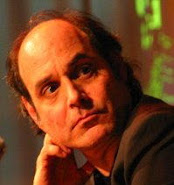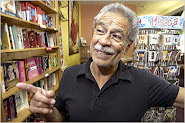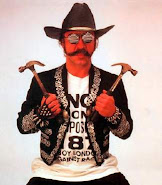
Latino Genius: Luis Alfaro
(Writer and Performance Artist)
Lesson plan created by Irma Vargas Rosas, M.A., M.Ed., Doctoral Student
Program in Culture, Literacy, and Language
Division of Bicultural Bilingual Studies
University of Texas, San Antonio
Lesson Plan Title – Critical Evaluation, Writing & Theatre
Learning Level
Grades 6-12
Grades 6-12
Pre-Instruction or Prerequisite Knowledge/Skills
Basic critical analysis, writing, and theatrical skills
Basic critical analysis, writing, and theatrical skills
Lesson Duration
4-5 sessions, 1-2 hours each
Students may choose to do research outside of class.
Learning Location
Computer lab and/or classroom, open space to rehearse
4-5 sessions, 1-2 hours each
Students may choose to do research outside of class.
Learning Location
Computer lab and/or classroom, open space to rehearse
Materials
Computers with printer/paper, chart paper
Computers with printer/paper, chart paper
PowerPoint available: http://grants.coehd.utsa.edu/ATE/support/Latino_Genius/Luis_Alfaro.pdf
Learning Objectives (Teacher may wish to modify them as she/he deems necessary: http://www.tea.state.tx.us/teks/)
Grades 6-8
English Language Arts/Reading
TEKS 2A: The student is expected to interpret speakers' messages (both verbal and nonverbal), purposes, and perspectives.
15F: The student is expected to compare text events with his/her own and other readers’ experiences.
18A: The student is expected to choose the appropriate form for his/her own purpose for writing.
14A: The student is expected to generate ideas and plans for writing.
Grades 6-8
English Language Arts/Reading
TEKS 2A: The student is expected to interpret speakers' messages (both verbal and nonverbal), purposes, and perspectives.
15F: The student is expected to compare text events with his/her own and other readers’ experiences.
18A: The student is expected to choose the appropriate form for his/her own purpose for writing.
14A: The student is expected to generate ideas and plans for writing.
Fine Arts
TEK 4A: The student is expected to demonstrate in dramatic activities that theatre is a
reflection of life.
Grades 9-12
English Language Arts/Reading
TEKS 20A, B: The student is expected to investigate the source of a media presentation or production such as who made it and why it was made; deconstruct media to get the main idea of the message's content.
1A: The student is expected to write in a variety of forms with an emphasis on literary forms such as fiction, poetry, drama, and media scripts
9B: The student is expected to compare text events with his/her own and other readers' experiences.
TEK 4A: The student is expected to demonstrate in dramatic activities that theatre is a
reflection of life.
Grades 9-12
English Language Arts/Reading
TEKS 20A, B: The student is expected to investigate the source of a media presentation or production such as who made it and why it was made; deconstruct media to get the main idea of the message's content.
1A: The student is expected to write in a variety of forms with an emphasis on literary forms such as fiction, poetry, drama, and media scripts
9B: The student is expected to compare text events with his/her own and other readers' experiences.
Fine Arts
TEKS 2A, C: The student is expected to demonstrate safe use of the voice and body; portray believable characters when applying acting concepts, skills, and techniques.
Procedure
1.) Teacher will create a concept web on chart paper with the word ‘genius’ in the center.
2.) Teacher will ask: Who is a genius?
3.) Teacher will write students’ suggestions on the chart paper
4.) Teacher will use Internet site to discuss the MacArthur Foundation and Fellows (geniuses). www.macfound.org/programs/fel/fel_overview.htm
5.) Teacher will inform students that Luis Alfaro is a MacArthur genius.
6.) Students will review ‘author’s purpose’ in literature and how applies to other sources (i.e. television, movies, theatre, etc.). http://www.teach-nology.com/worksheets/language_arts/authors/
7.) Teacher will distribute and review all rubrics for this project. http://grants.coehd.utsa.edu/ATE/support/Latino_Genius/Rubric_Collaborative_Skills.pdf;
TEKS 2A, C: The student is expected to demonstrate safe use of the voice and body; portray believable characters when applying acting concepts, skills, and techniques.
Procedure
1.) Teacher will create a concept web on chart paper with the word ‘genius’ in the center.
2.) Teacher will ask: Who is a genius?
3.) Teacher will write students’ suggestions on the chart paper
4.) Teacher will use Internet site to discuss the MacArthur Foundation and Fellows (geniuses). www.macfound.org/programs/fel/fel_overview.htm
5.) Teacher will inform students that Luis Alfaro is a MacArthur genius.
6.) Students will review ‘author’s purpose’ in literature and how applies to other sources (i.e. television, movies, theatre, etc.). http://www.teach-nology.com/worksheets/language_arts/authors/
7.) Teacher will distribute and review all rubrics for this project. http://grants.coehd.utsa.edu/ATE/support/Latino_Genius/Rubric_Collaborative_Skills.pdf;
English and Spanish versions included. Teacher may wish to make extra copies.
8.) Students use their knowledge of author’s purpose to research Luis Alfaro’s life using Google Scholar and by focusing on the 5Ws and How. http://en.wikipedia.org/wiki/Five_Ws
8.) Students use their knowledge of author’s purpose to research Luis Alfaro’s life using Google Scholar and by focusing on the 5Ws and How. http://en.wikipedia.org/wiki/Five_Ws
Sample Questions:
Who is Luis Alfaro?; Where does he live or work?; What does he do?; How does he make a difference in the community?; When did he get the MacArthur Fellowship?; Why did he get the fellowship?
Who is Luis Alfaro?; Where does he live or work?; What does he do?; How does he make a difference in the community?; When did he get the MacArthur Fellowship?; Why did he get the fellowship?
9.) Students will discuss their research findings on Luis Alfaro while teacher will list them on chart paper (5Ws and H). The following is some information regarding Luis Alfaro that the teacher may use:
Luis Alfaro is a Chicano writer/performer known for his work in poetry, theatre, short stories, performance and journalism. Alfaro is also a producer/director who spent ten years at the Mark Taper Forum as Associate Producer, Director of New Play Development and co-director of the Latino Theatre Initiative. He is featured in over 25 anthologies, has an award-winning spoken word CD, and was nominated for a local Emmy for his short film, CHICANISMO. He is a member of New Dramatists, an associate artist at Playwrights Arena and Cornerstone Theatre Company in Los Angeles.
10.) Teacher will review concepts ‘Chicano,’ ‘Chicana,’ and ‘social justice.’ http://content.cdlib.org/xtf/view?docId=ft058002v2&chunk.id=d0e7791&toc.depth=1&toc.id=d0e6486&brand=eschol;
http://en.wikipedia.org/wiki/Social_justice
11.) Students will discuss possible ideas for social justice in the City of San Antonio, State of Texas, and/or the United States.
12.) Teacher will list the topics on the board.
13.) Students will work in groups of 4-5 students to choose topic(s) that they will incorporate into the writing of a play which they will perform.
14.) Teacher will review the components of a play http://www.ehow.com/how_2045040_write-play.html
15.) Students will use their lived experiences and search engines to find information about their topic(s).
16.) Students will work with their group to write the play.
17.) Students will distribute copies of the final copy to all members of the group and the teacher.
18.) Students will perform their play.
19.) Students will evaluate the collaboration between members of their group. (Teacher may decide to have student the data for mathematical purposes.)
20.) Teacher will conclude the lessons by engaging students in conversation using the following two questions:
· Who is a genius?
· How have the experiences gained through these activities made you think about your future?
Luis Alfaro is a Chicano writer/performer known for his work in poetry, theatre, short stories, performance and journalism. Alfaro is also a producer/director who spent ten years at the Mark Taper Forum as Associate Producer, Director of New Play Development and co-director of the Latino Theatre Initiative. He is featured in over 25 anthologies, has an award-winning spoken word CD, and was nominated for a local Emmy for his short film, CHICANISMO. He is a member of New Dramatists, an associate artist at Playwrights Arena and Cornerstone Theatre Company in Los Angeles.
10.) Teacher will review concepts ‘Chicano,’ ‘Chicana,’ and ‘social justice.’ http://content.cdlib.org/xtf/view?docId=ft058002v2&chunk.id=d0e7791&toc.depth=1&toc.id=d0e6486&brand=eschol;
http://en.wikipedia.org/wiki/Social_justice
11.) Students will discuss possible ideas for social justice in the City of San Antonio, State of Texas, and/or the United States.
12.) Teacher will list the topics on the board.
13.) Students will work in groups of 4-5 students to choose topic(s) that they will incorporate into the writing of a play which they will perform.
14.) Teacher will review the components of a play http://www.ehow.com/how_2045040_write-play.html
15.) Students will use their lived experiences and search engines to find information about their topic(s).
16.) Students will work with their group to write the play.
17.) Students will distribute copies of the final copy to all members of the group and the teacher.
18.) Students will perform their play.
19.) Students will evaluate the collaboration between members of their group. (Teacher may decide to have student the data for mathematical purposes.)
20.) Teacher will conclude the lessons by engaging students in conversation using the following two questions:
· Who is a genius?
· How have the experiences gained through these activities made you think about your future?
Evaluation
The teacher may use the rubrics to assess students or other forms as she/he deems appropriate.
Teacher Resources
1. Alfaro, L. (2000). Straight as a line. In C. Svich & M.T. Marrero (Eds.), Out of the fringe:
The teacher may use the rubrics to assess students or other forms as she/he deems appropriate.
Teacher Resources
1. Alfaro, L. (2000). Straight as a line. In C. Svich & M.T. Marrero (Eds.), Out of the fringe:
Contemporary Latina/Latino theatre and performance (pp. 1-42). St. Paul, MN: Theatre
Communications Group.
2. Alfaro, L. (1998). Downtown. In H. Hughes & D. Román (Eds.), O solo homo: the new queer
performance (pp. 313-348). New York: Grove Press.
3. Román, D. Teatro viva!: Latino performance and the politics of AIDS in Los Angeles. In E.L.
Bergmann & P.J. Smith (Eds.), ¿Entiendes?: Queer readings, Hispanic writings (pp. 346-
369). Durham: Duke University Press.
About the Author
Irma Vargas Rosas is first generation Chicana, born and raised in Chicago, IL. She has three degrees from the University of IL, Chicago. She obtained a B.A. in Political Science and Spanish in 1996. Then she continued and obtained two masters degrees: an M.A. in Hispanic Studies specializing in Applied Linguistics in 1998 and M.Ed. specializing in Bilingual Education in 2003. She was a classroom teacher for several years in Chicago and in San Antonio, Texas and has experience in dual language, transitional bilingual, and ESL programs. She is currently a doctoral student in the College of Education and Human Development at the University of Texas, San Antonio in the Culture, Literacy, and Language Program. She currently lives in San Antonio with her partner Rita and their two perritos Corbatín and Lalito.






No comments:
Post a Comment